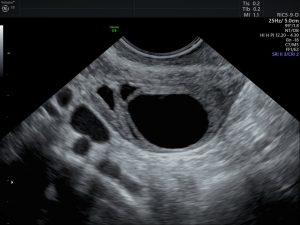#ThursdayThoughts
As promised, each Thursday, we will now offer you a piece of educational, science, or research related information. The purpose of our #ThursdayThoughts post is to share with you fact-based content that can enlighten and assist you on your fertility journey. Enjoy our post! Helping to Create New Beginnings….
Ovarian Cysts in Fertility Patients
Ovarian cysts are fluid-filled structures that occur within the ovaries. They can be seen on ultrasound in women of all ages and are almost always benign and asymptomatic. Some cysts are associated with pain and menstrual cycle irregularities; very rarely, cysts may be cancerous. There are multiple types of ovarian cysts. Depending on cyst type, size, ultrasound appearance, and how long it has been present on imaging, various types of treatment options are available. Treatments may include expectant management, as well as surgical removal or drainage.
Ovarian cysts are very common and are often seen in women undergoing fertility treatments. Normal ovarian activity also results in physiologic cysts; for example, ‘follicular cysts’ contain eggs while they mature prior to ovulation, and ‘corpus luteum cysts’ develop from these follicles after ovulation. Similarly, many ovarian stimulation protocols utilize oral or injectable medications for the purpose of maturing more than one egg- in these cases, multiple ovarian cysts are expected to be visualized on ultrasound.
Unfortunately, although they usually go away on their own, the presence of abnormal ovarian cysts can impact fertility testing and treatments. Some cysts make hormones which can interfere with certain ovarian reserve blood tests, and basal antral follicle count testing (an ultrasound test used to evaluate ovarian reserve) may also be less accurate. When cysts are seen early in the menstrual cycle, they can diminish ideal response to fertility therapy. In these cases, clinicians may recommend delaying treatment start and repeating an ultrasound in a week or longer, or a cyst drainage. Surgical removal is usually not necessary and is reserved for patients who have large symptomatic cysts, or those with risk factors for malignancy.
Although cysts can be frustrating for fertility patients and physicians alike, it is important to remember that cysts are usually harmless, and while they might delay treatment for a short time, they usually do not require patients to stop treatment.
If you have questions regarding the impact of ovarian cysts on fertility, please call the Fertility Institute of Hawaii at 808-545-2800 to schedule an appointment with a physician, or visit our website https://www.ivfcenterhawaii.com/ for more information.
